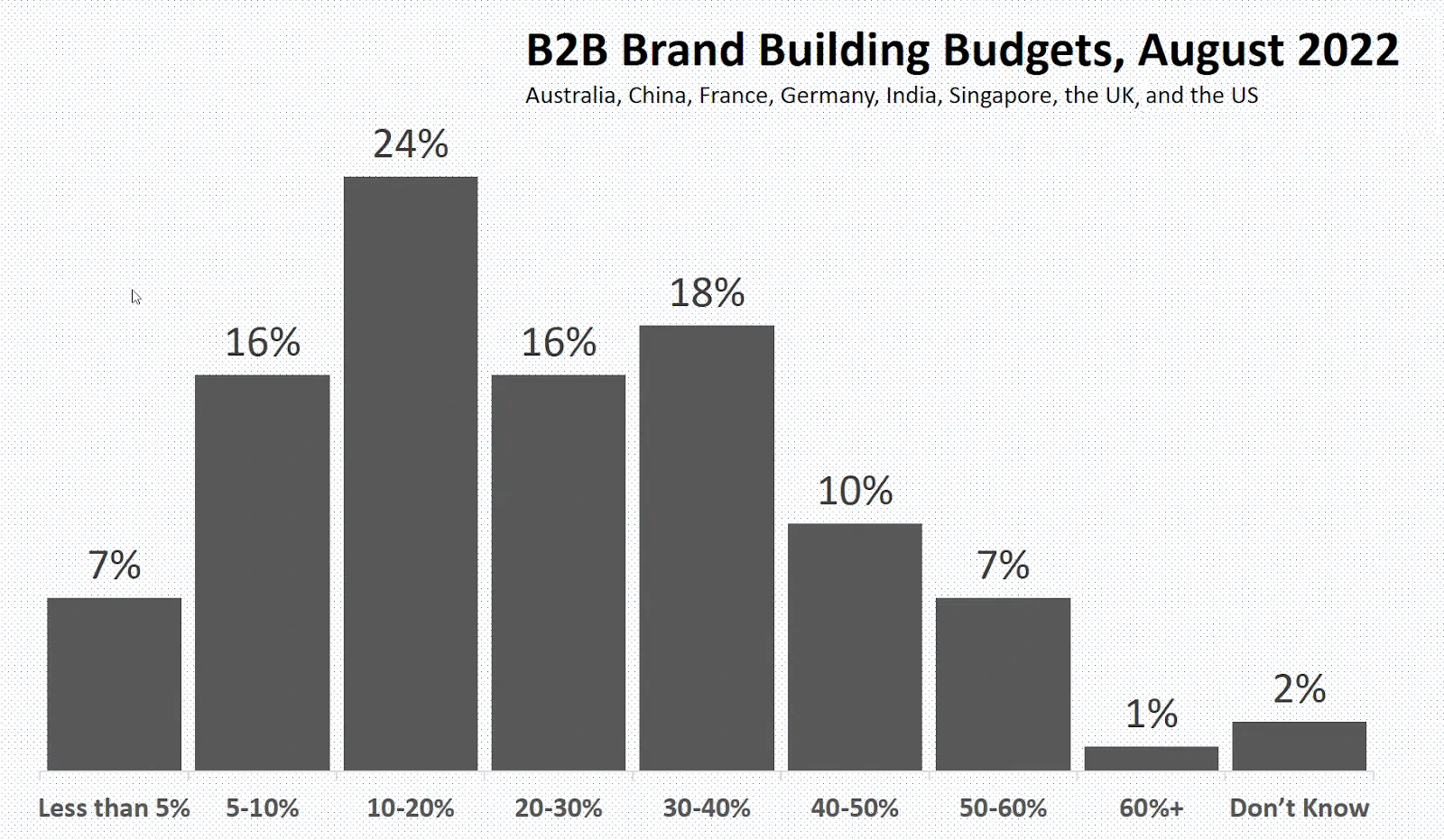When you think of your favorite brands, what names come to mind? Apple? Nike? Ford? Walmart? Coca-Cola? These labels are successful because they have strong branding. That means a clear and consistent message and a reputation for excellence, i.e., quality, reliability, and other factors. [1] [2] [3] [4] [5] This should also apply to B2B branding. Yet, in the business-to-business space, brand development has not been a traditional focus.
Does this mean branding is less effective for B2B than the business-to-consumer (B2C) model? Skeptics argue that the B2B market is more complex, catering to the demands of multiple stakeholders. It also sells niche products with lengthy sales cycles. It’s why some marketers think it’s better to focus on product details and pricing than branding initiatives.
This article discusses why B2B branding is less common than B2C. It also considers the benefits of branding, how to build a strong brand, and what happens to B2B companies that neglect this critical aspect. But first, an overview of B2B branding.
What Branding Means to B2B Companies
Branding in the B2B world is not fundamentally different from B2C. The American Marketing Association (AMA) explains that brands are unique identifiers that set products or services apart from rivals. They include names, designs, symbols, messaging, and other distinguishing features. Essentially, brands address what customers and clients think of and feel when they hear the company’s name. [6]
B2B Branding of the Past: An Outdated Approach
In the B2B realm, company branding has historically followed a more organic path. Instead of creating a distinct brand identity, marketers have concentrated on highlighting the technical aspects of their products or services. This approach is decades old. It originates from the belief that the average B2B buyer is more likely to buy something based on logic and practicality alone. That contrasts with B2C decision-making, where emotions influence decisions, such as deciding where to go on vacation.
That doesn’t mean business-to-business should follow the same approach as business-to-consumer. However, there is a need for B2Bs to align their branding efforts with the times, whether in-house or by partnering with a professional B2B branding agency.
——————————————————————————————————————————-
Boost Your B2B Brand with Bold Entity’s Expert Branding Services
Discover the real power of B2B branding with Bold Entity! Our expertise and innovation help drive exceptional results by creating and managing strong brands. As an expert digital marketing agency, we understand how your brand equity differs from consumer branding.
Learn How We Create Brands That Resonate with Your Target Audience
——————————————————————————————————————————-
Why Branding Matters in B2B
The Boston Consulting Group, Inc.(BCG) and Google conducted a survey in 2021 with over 100 senior marketing and IT executives from B2B and B2B2C businesses. The survey discovered that brand marketing is at least as effective in the B2B realm as in the consumer domain. Yet despite these findings, B2B companies continue to underinvest in brand marketing. Almost a quarter of respondents said they allocate less than 20% of their marketing budget to brand initiatives. [7]
The survey’s findings show that overlooking the significance of B2B brand marketing is a costly error. Brand strategies not only enhance the brand itself but positively impact other factors, which we’ll get to shortly.
Small branding budgets do not only pertain to the US. This 2022 chart looks at branding budgets across eight countries (including the US), showing its low priority. Needless to say, B2B companies investing in branding are at a significant advantage over those who don’t.
 B2B Brand Building Budgets Chart
B2B Brand Building Budgets Chart
Data Source: Marketing Charts
The Absence of Strong Emotional Branding
Numerous data have debunked the outdated belief that B2B buyers make purely rational, emotionless decisions. In reality, when there’s NO strong brand or perceived value, products and services become indistinguishable, leading to competition primarily based on price.
According to Google Consumer Insights, B2B buyers are nearly 50% more likely to purchase a product or service when they perceive personal value. [8] [9] Another study by the LinkedIn B2B Institute saw that marketing strategies aimed at eliciting emotional responses are more effective than those based solely on logic. This B2B branding research also found the emotional approach to be sevenfold more effective in improving financial performance, i.e., sales, profits, revenue, and other measures. [10]
Let’s see how the absence of a strong brand impacts the competitive landscape. This example demonstrates how distinguishable B2B brands stand out from rivals.
A Tale of Two Companies: The Power of Branding
Consider two construction or engineering firms that offer the same core services. Their unique selling points may not be obvious to buyers just from service offerings and technical features. Without a strong brand, they rely solely on price competition. In contrast, B2B companies that have established a reputation and trust through branding attract more business and command premium pricing. Let’s use Intel and IBM to illustrate this point.
Intel and IBM: Trusted B2B Brand Examples
Other companies may produce products that match the performance of Intel’s semiconductors or achieve the level of technological excellence associated with IBM. Yet, they struggle to compete due to their lack of strong branding investments. This creates a barrier to entry and makes it challenging for weak-branded rivals to gain a foothold in competitive markets. So, B2B companies absolutely benefit from the power of a recognizable brand. Branding instills trust, reliability, and recognition.
The Future of B2B Branding: 2023 and Beyond
The B2B landscape has evolved and continues to change. B2B buyers, like their B2C counterparts, are now influenced by factors beyond tech specs, product features, and cost. Trust, credibility, reliability, and a strong brand identity have become crucial in establishing and preserving relationships.
The following sections explore why B2Bs need a solid branding initiative.
Your B2B Brand Is More Than a Logo
There is a common misconception that B2B branding begins and ends with an eye-catching company logo and customized stationery. It encompasses so much more. The aim is to strategically position your business to communicate its unique value within its industry. For that, you need a distinctive identity that goes beyond whatever product or service you offer.
To be successful, your brand must establish a clear differentiation in the market. It’s a simple concept but not so easy to achieve.
7 Reasons Branding Makes Sense for B2Bs
#1 Competitive Differentiation: Branding helps B2Bs stand out from close rivals. It allows a business to convey its unique value proposition and prove itself as an industry leader.
#2 Improved ROI in performance marketing: Investing in brand identity offers benefits beyond enhancing the brand. When done effectively, it boosts your marketing ROI, attracting and converting more qualified leads to customers.
#3 Amplified customer endorsement: Strong brands encourage customer advocacy through social media, word of mouth, and other channels. The promotion of your offerings by loyal customers is no small detail.
#4 Enhanced worker satisfaction: It’s a mistake to underestimate the importance of employee satisfaction in any business. B2B companies with strong brands are better at attracting top talent and retaining their most productive employees.
#5 Larger product launches: Strong brands build trust and credibility, boosting customer engagement when companies launch new products or services.
#6 Long-term value: A robust B2B brand can increase customer lifetime value, resulting in long-term revenue and increased profits.
#7 Consistency across touchpoints: Branding creates a consistent customer experience across all touchpoints, online and off. This results in cohesive, memorable impressions.
How to Differentiate and Position a B2B Brand
Positioning your B2B brand to stand out and differentiate itself in a competitive market requires a strategic approach. That means gaining a profound grasp of the industry in which your company operates. You also need a thorough understanding of your target buyers’ demands, preferences, and pain points.
To effectively build a brand that resonates and captures attention, there are several key areas of primary focus to consider in three categories.
Brand Strategy and Positioning
- Unique value proposition (UVP)
- Brand storytelling
- Consistent brand messaging
- Visual identity
Customer Focus and Engagement
- Customer-centric approach
- Customer experience
Industry and Market Awareness
- Industry insights
- Thought leadership
- Measuring and adapting
When differentiating and positioning B2B brands, the elements of most focus will vary between businesses, industry, target audience, and strategic goals. It’s no small feat, which is why many companies seek the services of a professional branding agency. If you decide to research brand marketing tips and strategies online, make sure they’re relevant to your business and up to date with current trends.
The Role of a B2B Branding Agency
 Branding Agency Experts Working Alongside In-House Marketing Personnel
Branding Agency Experts Working Alongside In-House Marketing Personnel
A professional B2B branding agency acts as a guiding force in the complex branding process. Expert digital marketers determine the core elements of your company’s identity while crafting a clear and compelling message. They then strategically employ various B2B branding tools to amplify and solidify that message. Moreover, agencies help companies establish trust and build strong brand identities. And they align brand promises with delivery while maintaining consistent communication.
Agency Vs. In-House Marketing
A marketing agency brings a fresh, external perspective. It often provides unique insights and benefits that in-house marketers may not readily have. However, it doesn’t have to be one or the other. Quite often, an agency’s external perspective complements the internal knowledge and expertise of the in-house team.
This collaborative approach can harness the strengths of both sides to create effective branding and marketing strategies. A hybrid system allows your organization to benefit from external expertise while maintaining control over its brand and messaging.
7 Key Considerations When Hiring a Branding Agency
There are good reasons why B2B businesses seek the help of professional branding firms. The unique nature of B2B branding requires specific skills and expertise. But before hiring a branding agency, review their track record, reputation, and, most crucially, their experience with B2B brands. Consumer brands and B2B brands differ vastly. Therefore, the agency must possess the specific skills and nuances to position your brand successfully.
You will have unique expectations, but the seven points below are vital considerations:
- Industry experience
- Track record
- Services offered
- Client references
- Transparency
- Customized strategies
- Team expertise
——————————————————————————————————————————-
Bold Entity: Digital Marketing Services for B2Bs
Bold Entity’s digital marketing services help increase your B2B branding by boosting brand awareness, improving customer conversions, and communicating your company’s product value. We offer various digital marketing services to support your branding initiatives, including website design/revamp, SEO strategies, PPC, social media, content, email marketing, and more.
Learn About Our B2B Brand-Boosting Digital Marketing Solutions Here
——————————————————————————————————————————-
B2B Branding Measurement
Measuring B2B branding ROI typically involves gauging consumer loyalty, recognition, and profits, especially in highly competitive sectors. Keeping tabs on your ROI will help you shape strategies that lead to faster sales cycles and sustained growth and attract top talent. That last point is crucial for companies struggling to recruit and retain skilled workers.
Various tools and methods are available for measuring the ROI of a brand. Your company should tailor processes and use tools that work with your specific goals, industry, and target audience, testing B2B branding strategies and more.
In Conclusion
B2B branding is crucial for businesses to stand out, attract and retain customers, and boost bottom lines. With a strong brand, you build trust, credibility, and reliability, all essential for success in the competitive B2B world. So, to differentiate your brand and position it for success, invest in a strategic approach aligned with current B2B consumer trends.
Lastly, consider working with a professional branding agency to revamp a weak brand or to develop a new identity, messaging, and visual presence.
——————————————————————————————————————————-
Resource Links
- https://www.counterpointresearch.com/us-market-smartphone-share/
- https://hypebeast.com/nike-worlds-most-popular-sneaker-brand/
- https://www.statista.com/Ford-leading-US-car-brand/
- https://nrf.com//2023-Walmart-top-US-retailer/
- https://www.beveragedaily.com/Coca-Cola-tops-soft-drinks-brand/
- https://www.ama.org/topics/branding/
- https://www.bcg.com/BCG-Google-survey/
- https://www.linkedin.com/B2B-companies-bolster-brand-building/
- https://www.thinkwithgoogle.com/emotion-b2b/
- https://business.linkedin.com/B2B-institute/








